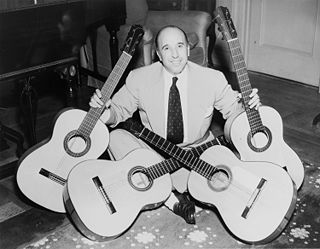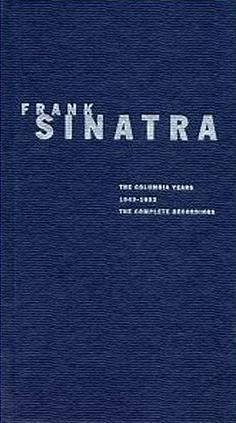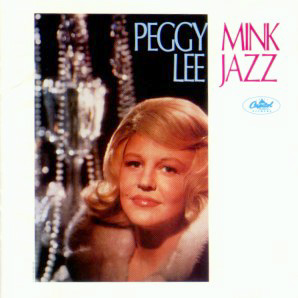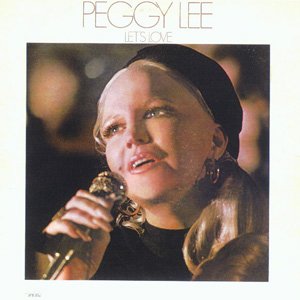
Norma Deloris Egstrom, known professionally as Peggy Lee, was an American jazz and popular music singer, songwriter, and actress whose career spanned seven decades. From her beginning as a vocalist on local radio to singing with Benny Goodman's big band, Lee created a sophisticated persona, writing music for films, acting, and recording conceptual record albums combining poetry and music. Called the "Queen of American pop music", Lee recorded more than 1,100 masters and co-wrote over 270 songs.

This is a list of notable events in music that took place in the year 1954.

James Francis McHugh was an American composer. One of the most prolific songwriters from the 1920s to the 1950s, he is credited with over 500 songs. His songs were recorded by many artists, including Chet Baker, June Christy, Bing Crosby, Marlene Dietrich, Deanna Durbin, Ella Fitzgerald, Judy Garland, Adelaide Hall, Billie Holiday, Beverly Kenney, Bill Kenny, The Everly Brothers, Peggy Lee, Carmen Miranda, Nina Simone, Frank Sinatra, and Dinah Washington.
John Alfred Mandel was an American composer and arranger of popular songs, film music and jazz. The musicians he worked with include Count Basie, Frank Sinatra, Peggy Lee, Anita O'Day, Barbra Streisand, Tony Bennett, Diane Schuur and Shirley Horn. He won five Grammy Awards, from 17 nominations; his first nomination was for his debut film score for the multi-nominated 1958 film I Want to Live!
"Baubles, Bangles, & Beads" is a popular song from the 1953 musical Kismet, credited to Robert Wright and George Forrest. It is based on an 1881 piece by Russian composer Alexander Borodin.

Ella Swings Brightly with Nelson is a 1962 studio album by the American jazz singer Ella Fitzgerald, accompanied by an orchestra arranged by Nelson Riddle.

The Columbia Years 1943–1952: The Complete Recordings is a 1993 box set album by American singer Frank Sinatra.

Jump for Joy is an album by jazz singer Peggy Lee that was released in 1958 and arranged and conducted by Nelson Riddle.

"If You Were the Only Girl (In the World)" is a popular song, composed by Nat D. Ayer with lyrics by Clifford Grey. It was written for the musical revue The Bing Boys Are Here, which premièred on 19 April 1916 at the Alhambra Theatre in Leicester Square, London. The song was originally performed as a duet between Lucius Bing, played by George Robey, and his love interest Emma, originated by Violet Loraine.

Mink Jazz is a 1963 studio album by Peggy Lee, arranged by Benny Carter and Max Bennett.

Let's Love is an album by jazz singer Peggy Lee that was released in 1974. It was her first for Atlantic Records after many years with Capitol. The title track was written, arranged, produced by Paul McCartney.

Sing to Me Mr. C was Perry Como's Eighth RCA Victor 12" long-play album. Joe Lipman was the chief music arranger for the release.
"Street of Dreams" is a song and foxtrot composed in 1932 by Victor Young, with lyrics by Sam M. Lewis. There were three successful recordings of the song in 1933 by Guy Lombardo, Ben Selvin and Bing Crosby.
"Do I Love You?" is a 1939 popular song written by Cole Porter, for his musical Du Barry Was a Lady, where it was introduced by Ronald Graham and Ethel Merman.

Tony Bennett at Carnegie Hall is a 1962 live album by Tony Bennett. The June 9th concert was directed by Arthur Penn and Gene Saks. Carnegie Hall had not featured a pop performer until April 23, 1961 when Judy Garland recorded her legendary concert.

"That Old Gang of Mine" is a 1923 popular song composed by Ray Henderson with lyrics by Billy Rose and Mort Dixon, and published by Irving Berlin, Inc. It was introduced in the Ziegfeld Follies of 1923 by the vaudeville duo Van and Schenck. The song became a million-seller.

Classic Duets is a 2002 compilation album by Frank Sinatra.
"Then I'll Be Happy" is a jazz standard composed by Cliff Friend, with lyrics by Lew Brown and Sidney Clare. It was first published in 1925. A popular recording in 1926 was by Whispering Jack Smith.

The Music of Johnny Mathis: A Personal Collection is a box set by American pop singer Johnny Mathis that was released in 1993 by Columbia Records and gave an overview of his career with four CDs containing 86 tracks that he selected himself. In the liner notes he wrote that his "undying gratitude is really to the lyricists and composers of all these memorable songs. Without the words and music I have sung over the years, my career as a singer would not have existed. My thanks is always to these special and gifted people."
"I Never Had A Chance" is a popular song written by Irving Berlin, published in 1934. Popular versions that year were by Eddy Duchin and by Glen Gray & The Casa Loma Orchestra.













